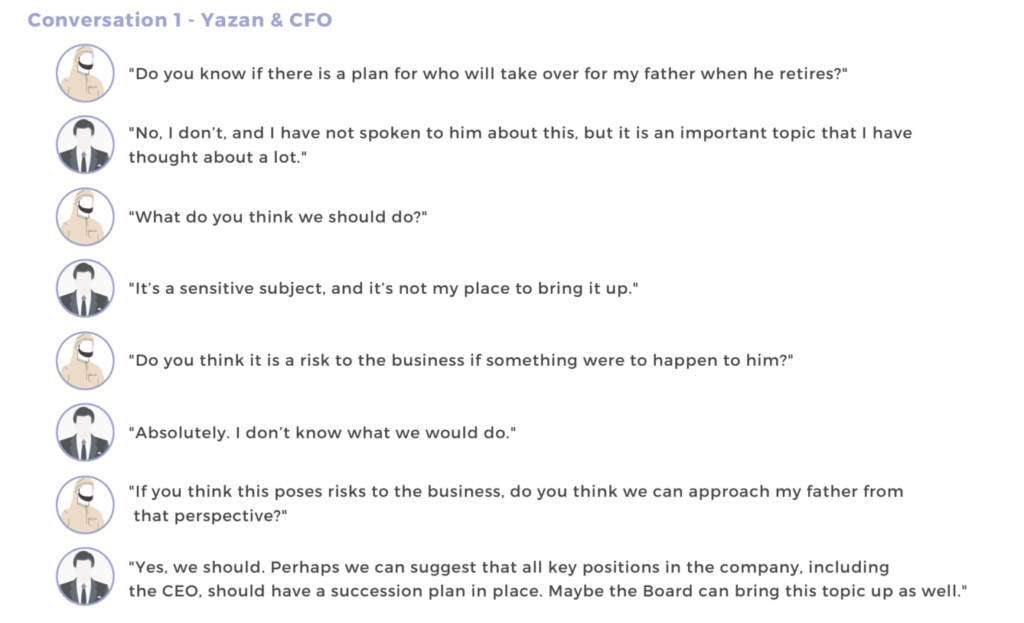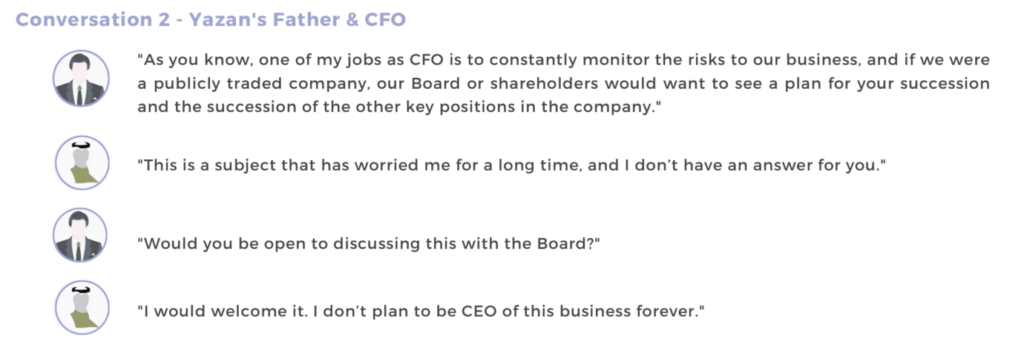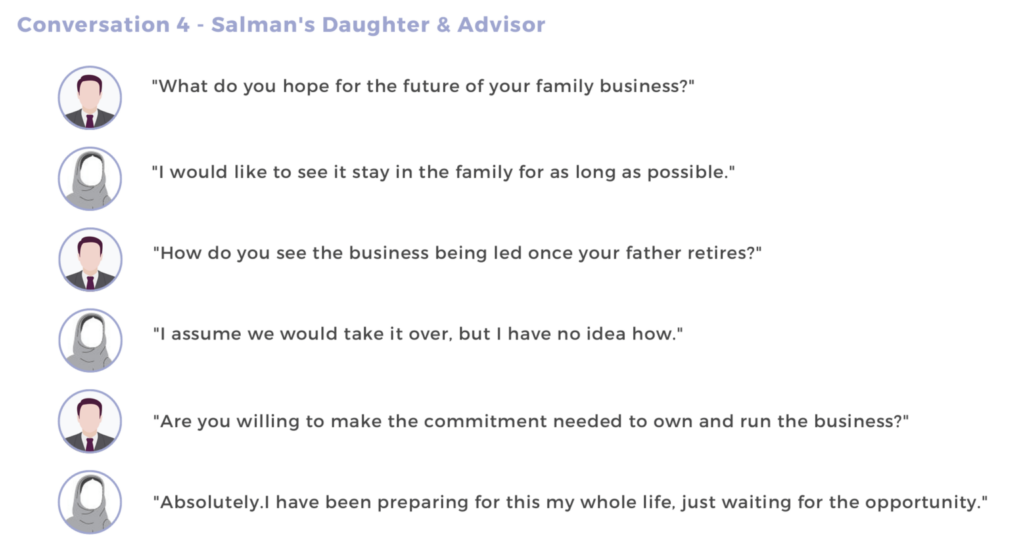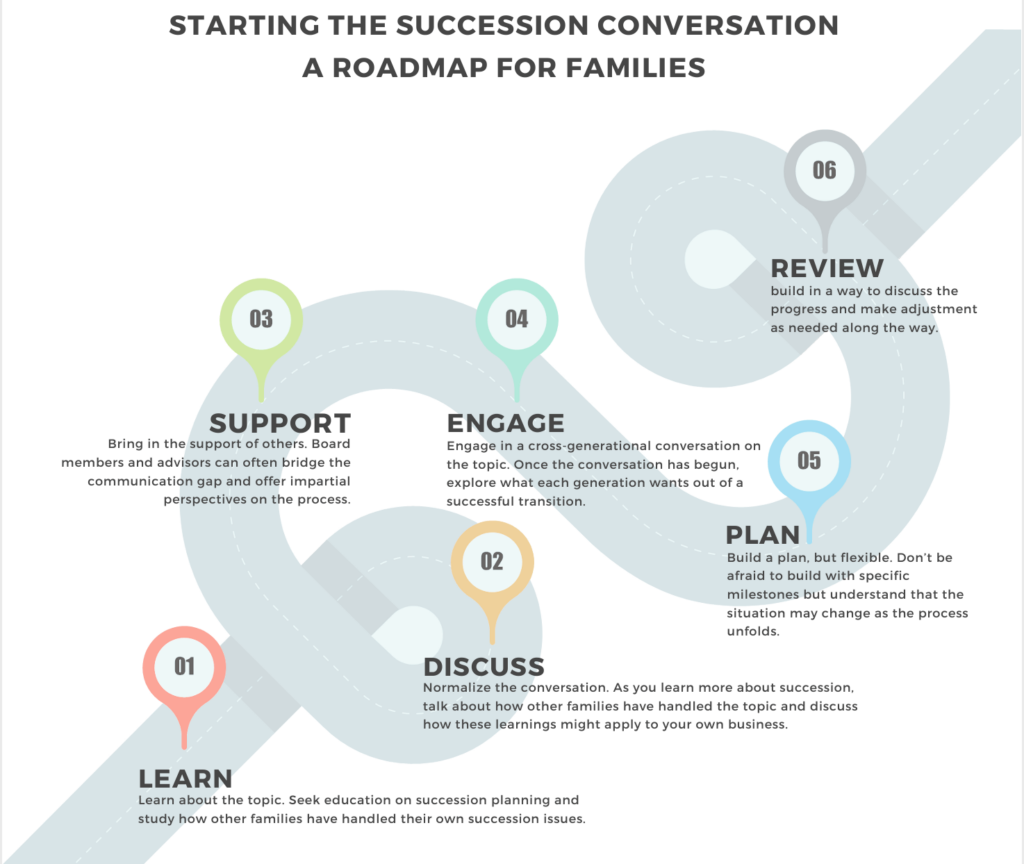How Can We Begin The Succession Conversation?
Summary: Succession in family businesses is a complex topic that involves many different constituencies. It can also be a very sensitive topic for family members and employees. For these reasons, many families put off the conversation, sometimes for years, which makes a successful transition even more challenging. This Knowledge Snapshot will suggest practical ways how different generations can start the conversation and share a roadmap of steps to guide families.
How do the current and rising generation perspectives differ?
A well-planned succession process can set a family enterprise on a successful path for a generation. If planned poorly, it can lead to anxiety, conflict, poor business performance or even the loss of a family business. Most families know they need to put a plan in place, but how do you get such a process started?
Salman (names disguised) had a dilemma. He had run his family’s business for 30 years. He was in his late 60s and was thinking about moving on to other interests. However, he didn’t have any idea whether the next generation of the family was interested in joining the family business, much less take it over. He still saw his children as “children”, and no one ever asked him about his own retirement or succession plans. However, as he felt the desire to slow down, he was feeling increasingly “stuck” in his position with no way out.
In another family, Yazan was an eager 35-year-old member of the next generation of his family. He had worked in his family’s business since graduating college, but his father, in his 70s, was firmly in control as he had been since taking over from his father 40 years ago. Yazan never got invited to Board meetings and never had any conversations with his father about his succession plans. As he was thinking about the next steps in his own career, Yazan was struggling to understand whether there was a place for him in the business in the future.
In these examples, the time for transition had come, but for different reasons, it was not able to get started. What stands in the way of putting a succession plan in place, and how can you overcome those barriers?
In our experience, the current and rising generations each have different fears they must first overcome to start the conversation. These are difficult fears to address, which is why conversations about succession sometimes require the assistance of advisors, family members, or senior executives in the business to get started.
In the example above, Yazan decided to enlist the help of the CFO of the business. The following is a model of the approach he used:

Once the conversation was opened, Yazan’s father opened up about his own concerns about not having a succession plan in place and enlisted the help of the Board to develop one, as the conversation between the CEO and CFO below models.

In this case, the CEO was relieved to find an outlet for the process, and once the Board was engaged, the rest of the family was brought in to weigh in with their thoughts and design a plan.
In the other example, Salman was the CEO who enlisted the help of an advisor to start the conversation with his children.

The advisor approached the next generation with the questions below:

Salman was surprised to find so much enthusiasm from the next generation to carry on the legacy he had built. Fortunately for the family, they benefited from several years of both generations working together before Salman completely stepped away from the business. In his words, “Just knowing that we had a plan gave me the comfort I needed to stay as long as was needed to ensure my family and the business were both successful.”
What are the components of succession we should cover?
Once both generations have engaged on the topic, what’s next? In our experience, succession does not unfold naturally. It must be discussed, planned, and carefully executed over the course of several years. There are many constituents that must come together among the shareholders, family, executives, and outside advisors. Most successful succession conversations, at their core, align both generations on the “big” questions that must be addressed upfront.
Key starting questions include:
Do we want the next generation to own this business together?
This is the fundamental question of succession that owners and future owners must align on. It may be that the next generation is not interested in owning the business, or the current generation may be concerned about whether owning the business together in the future will hurt family relationships. Aligning explicitly on this question will provide the foundation to create a succession plan.
If the family does want to continue to own the business, why do we want to own it together?
Aligning on the reasons for ownership in the form of common Values, Mission and Vision will begin the process of defining what co-ownership means and what compromises each member of the family will need to make going forward.
Who will own the assets in the next generation?
Understanding who the owners will be will provides the basis for how decisions will be made and for how the financial benefits of the business will be distributed. In most Muslim countries, Sharia dictates these choices, but even that is complicated by some families exercising their right to control how at least some of their assets are distributed to their heirs.

For a toolkit of questions to consider when starting succession conversations, see the original article.
Originally published by Family Business Council Gulf, November 2022.